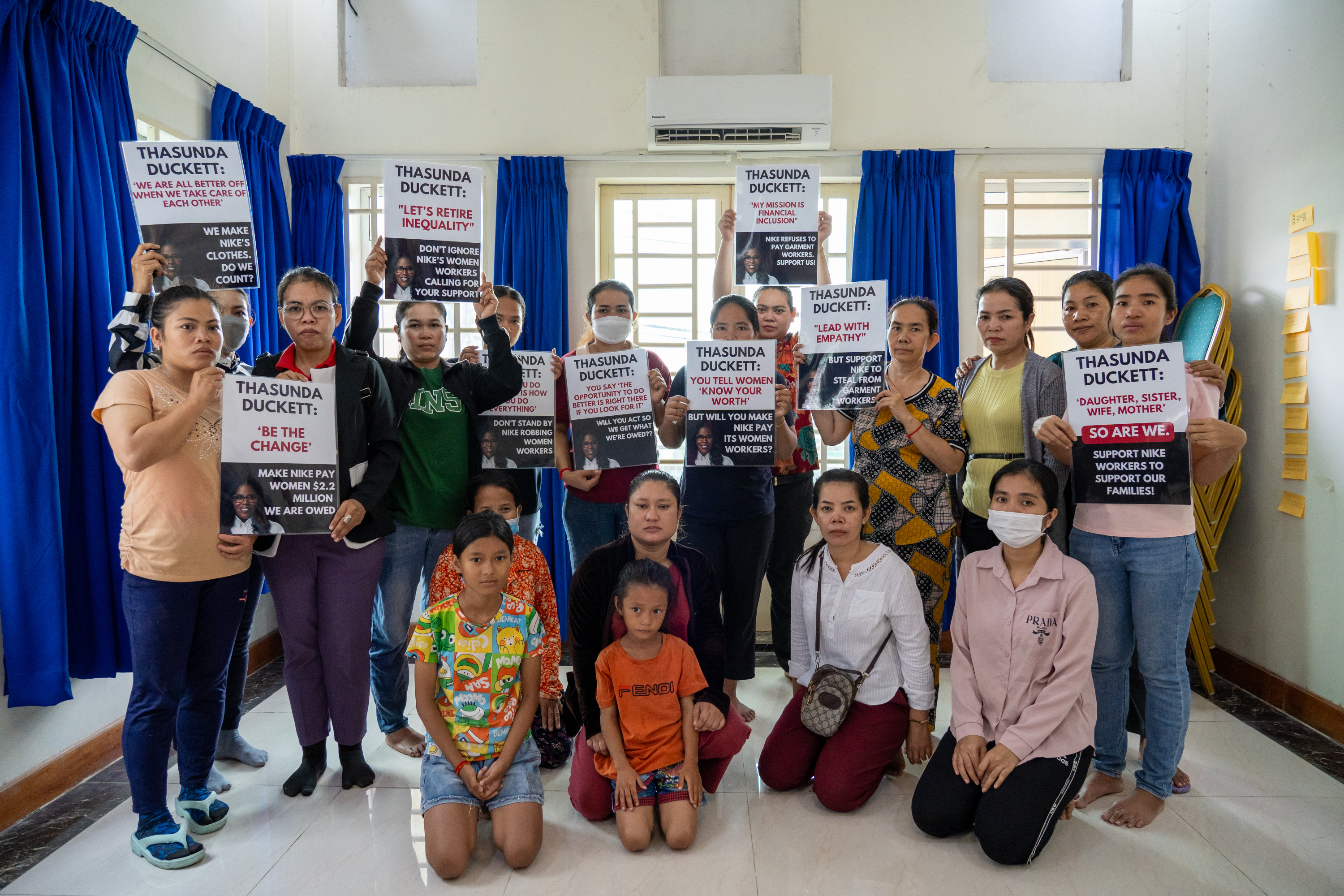
Nike under fire over the sportswear giant’s three-year refusal to pay its garment workers
Nike is facing growing pressure in anticipation of its online AGM on 12 September over its steadfast refusal to pay more than 4000 garment workers $2.2 million in unpaid wages and benefits since 2020. Unprecedented concerns are mounting from Nike investors, human rights groups, unions, and consumers that Nike has become a corporate outlier on human rights issues, once again achieving notoriety for failing to ensure that women workers in their supply chain are given their basic rights, despite the company’s own stated commitments and code of conduct.
In Cambodia, 1,284 workers of the Ramatex owned Violet Apparel factory were fired without being paid $1.4 million in legally owed benefits when the factory closed in July 2020, with many of these women having worked at the factory for over a decade. Despite incontrovertible photo and documentary evidence showing Nike products made in the factory, Nike’s bizarrely denies their products were made there even while producing clothes at three other Ramatex-owned factories in Cambodia and fourteen worldwide, raising serious concerns about Nike’s abject failure of human rights due diligence processes.
And in the Hong Seng Knitting factory in Thailand over 3000 mostly Burmese migrant workers were denied legally owed pandemic furlough pay in 2020, which even a Thai court has maintained is owed. In this case, Nike’s excuse is that workers voluntarily gave up their wages, now amounting to over $800,000, with pregnant workers among those that lost the most.
More than 50 leading human rights organisations and unions from around the world, including Human Rights Watch, Oxfam, and Workers United, published a detailed statement on the Violet Apparel case, calling on Nike to resolve both egregious violations in full. Nike has been engaged by multiple groups around the world on both cases for more than three years and have steadfastly refused to pay workers what they are owed, instead defending their rights-abusing supplier partners.
Workers efforts to be heard by Nike have been consistently ignored in spite of repeated protest actions at grave personal risk. Ahead of the AGM, Violet Apparel workers called on Nike Board Executive Thasunda Brown Duckett to raise her voice within the company for swift payment to workers, in line with her stated commitments in support of women workers of colour and labour rights. A LinkedIn push targeting Thasunda Brown Duckett, had by the morning of 11 September attracted over 90 comments that have been left on this LinkedIn post urging her to use her position to ensure justice for the Violet Apparel workers.
Major Nike investors, many whom have never taken public positions on ESG issues before, have now also joined the call for Nike to just pay the workers the $2.2 million the are owed, issuing a public letter and using the AGM to call for investors to sign on. As of 11 September, over a dozen investors have added their name to the letter and the list continues to grow.
The situation for these Nike workers remains dire, with women and their families struggling to survive. One former worker of the Violet Apparel factory said: “As soon as the factory closed there was a tsunami of issues affecting my life – my husband was in an accident and I could not find a new job, I had to suspend my children going to school because I could not afford it. I had to sell everything I saved up for when I had a good job.”
Bogu Gojdź, campaign coordinator at Clean Clothes Campaign, said: “Nike falsely positions itself as a supporter of women’s empowerment, while holding back $2.2 million they owe to vulnerable women of colour who made their clothes. There is nothing but cruelty that stands in the way of Nike paying these workers what they are owed, everyone can see it, Nike and its Board of Directors must act immediately to provide justice to these workers.”
Background
- Worker Rights Consortium published an investigative report on Violet Apparel rights violations in June 2023.
- Human Right Watch wrote a Dispatch on Violet Apparel in July 2023 and the case featured in its November 2022 report about organising in Cambodia.
- Worker Rights Consortium has an ongoing investigative report on rights violations in the Hong Seng Knitting factory.
- Worker testimony is available from a former Violet Apparel worker and a Hong Seng Knitting worker.